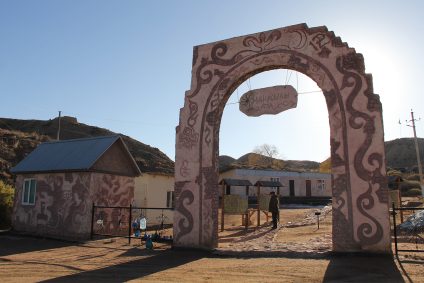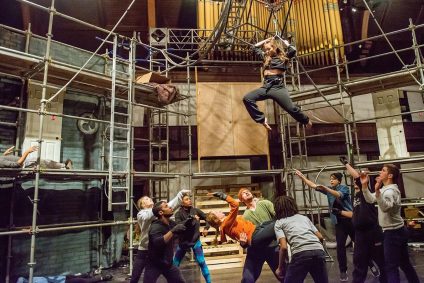(Chronicle of Philanthropy) — When I was a child, my parents told me identity stories.
My favorite was the story of my great-grandfather on my father’s side, who moved from a village in India to the city of Bombay, carrying nothing but a wristwatch and a can of clarified butter. He made his living selling vegetables off a pushcart and vowed that his work would allow future generations of his family to have better lives.
For my parents, these identity narratives were unambiguously stories of strength and sources of pride. To be an Ismaili Muslim from India, to come from a line of people who sacrificed in the present to build a foundation for the future, was a profound privilege that conferred upon me a solemn responsibility. The message was clear: You come from a magnificent tradition and must strive to live up to it. You accomplish that through what you do for others.
I started Interfaith America (originally, Interfaith Youth Core) because I wanted our national culture to pay more attention to how identity stories, especially narratives of religious identity, inspire diverse people to achieve great things, serve others, and work together.
But I’ve become deeply disappointed by the way identity is currently constructed in much of the social-change sector.
Let me demonstrate by telling a story about my son, a junior at a selective-enrollment high school on the north side of Chicago. He volunteers at a cool arts nonprofit and applied to be one of the speakers at the organization’s annual event because he wanted to share how the program had affected his life.
He expected the interview process to focus on his people skills and public speaking abilities. When they asked about his identity, he was excited to talk about how being an Ismaili Muslim whose family came to the United States from India had inspired his commitment to both volunteering and academic excellence.
Invested in Marginalization
But the interviewer wasn’t interested in how my son’s ethnic minority identity was a source of inspiration. Instead, she wanted to know if he thought it qualified him as marginalized. I watched my son shake his head during the phone call, as if to say, Are we really going down this road? He emphasized again that he was a minority, and yes there were challenges that came with that, such as all the times his name is mispronounced. But mostly his identity was a source of strength and empowerment.
The questions about marginalization did not stop with the phone call. Several texts followed confirming interest in my son as a speaker if he was able to show up as an oppressed person. They were invested in my son seeing himself — or at least presenting himself — as marginalized.
It was not the first time.
He was in a summer program for high school students interested in diversity in which the only participants encouraged to speak about their privilege were the straight white Christian boys. Everybody else was urged to tell stories of victimhood based on identity.
Those involved in the college admissions process have also subtly signaled to my son that telling a story about the marginalization he has experienced because of his identity will improve his chances of getting into a selective university.
My son’s experience isn’t unique. Both the Atlantic and the New York Times have recently run stories about what might be called the privileging of marginalization.
Why is this phenomenon so widespread? One reason is that social change nonprofits have attracted a concentration of people committed to the idea that the system is irredeemably white supremacist. To prove themselves right, they need every nonwhite person to see themselves as a victim.
But seeing yourself as a victim has profoundly negative consequences.
The psychologist James Marcia points out that healthy people construct their sense of self around a story of “identity achievement.” In this narrative arc, you are the author of your life, working towards a heroic ideal, walking a worthy path.
Telling young people to view themselves as victims is literally the opposite of putting them on the path to identity achievement. Offering prizes for oppression narratives, such as speaking slots and admission to selective colleges, is a form of entrapment. It encourages young people to think about themselves in ways that could have disastrous long-term consequences.
The Black sociologist Musa al Garbi puts it this way: “The more people perceive themselves to be surrounded by others who harbor bias or hostility against them, and the more they view their life prospects as hostage to a system that is fundamentally rigged against them, the more likely they become to experience anxiety, depression, psychogenic and psychosomatic health problems, or to behave in antisocial ways.”
In fact, people who obsess about their own oppression are actually less effective social-change agents.
Author Jill Filipovic points outs that personal agency is a precondition for structural change, noting that “social change becomes possible only if our movements are made up of people who believe that the adversities they have faced are surmountable, that injustice does not have to be permanent, that the world can change for the better, and that they have the ability to make that change.”
Viewing identity as a status of victimization rather than a source of pride feels like a spiritual violation of everything I was taught about identity, especially the cherished stories my parents told me about our faith and family. For my family, coming from India meant enduring, thriving, and helping others thrive. Being Muslim was not principally about being a victim of Islamophobia. It was about being inspired by Islam to make our lives and the lives of others better.
I’m proud that my teenage son is involved with diversity programs, arts groups and other nonprofits. I only wish that the staff of those organizations spent less time asking him about his marginalization, and more time talking to him about the pride he takes in his identity and how it inspires him to work for social change.
This article was originally posted on the Chronicle of Philanthropy.
Latest Articles
-

American Civic Life
Once Protected by its Remoteness, a Sacred Lake in Kyrgyzstan is Threatened by Change
April 26, 2024
-

-

-

-

Interfaith America Interview
"You Desperately Need Rest," Author Dalton-Smith on Sacred Rest
April 16, 2024
Join us today
Get inspired, equipped, and connected to unlock the potential of America’s religious diversity.